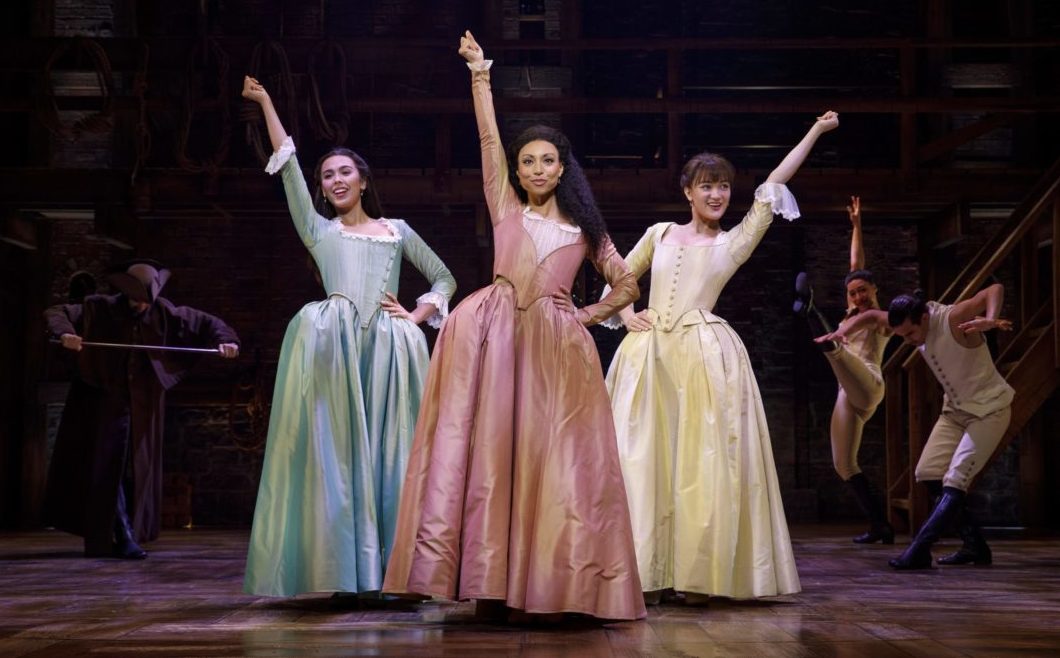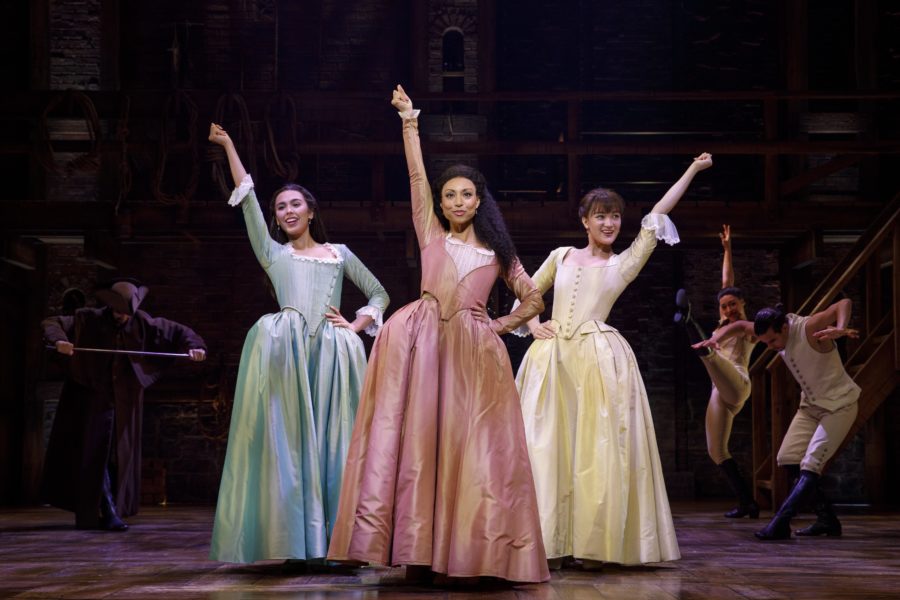
Photo: Joan Marcus/courtesy of Broadway in Boston
Sister act: Hamilton’s portrayal of the Schuyler siblings, corseted dresses and all
Today’s hottest historical musical, Hamilton, is finally coming to town with a limited run at the Boston Opera House from Sept. 18–Nov. 18. The show stars Ta’Rea Campbell and Sabrina Sloan as Angelica Schuyler and Shoba Narayan, respectively, and Julia K. Harriman as Eliza Hamilton. Though some tickets are still available, they’ll cost you a minimum of $200 each. But, alas, there’s hope: Every show will make 40 tickets available for $10 apiece through a lottery. You can enter on the Hamilton app starting Sept. 16.
But even if you can’t be in the room where it happens, you can dive into the juicy history behind the show. Exhale spoke with local historians to get the real story behind the musical sensation, and the women who made Alexander Hamilton’s legacy possible.
History with a Capital ‘H’
Catherine Allgor, president of the Massachusetts Historical Society and champion of historical women, encourages Hamilton viewers to take the theatrical performance with a grain of salt. “Hamilton isn’t history, it’s a piece of art. A fabulous piece of art,” she says. “If you took the women and you put them at the center of that story, things would look very different.”
Some clear artistic license was taken in the creation of Hamilton. For example, Angelica, Eliza’s older sister, and Alexander are framed as thwarted lovers who carry a flame for each other their whole lives. In fact, Angelica was already married with two children when Eliza met Alexander.
Though there were rumors of an Angelica-Alexander affair, Tilar J. Mazzeo, author of Eliza Hamilton: The Extraordinary Life and Times of the Wife of Alexander Hamilton, says there’s no firm proof and it’s unlikely given the tight living quarters of the time. “They were living with nearly half a dozen children, with servants, and at different times her mother was there. And I’m like, OK, there were three bedrooms for all those people—where did the secret sex happen? It just doesn’t make any sense,” says Mazzeo.
Other indiscretions remain murky. (Caution: 250-year-old spoiler alert!) The greatest romantic drama comes from Alexander’s self-professed affair. He cheats on Eliza and writes about it in a self-published pamphlet in 1797 to explain his questionable money management. Mazzeo backs the theory put forward in the 1970s that the affair never actually happened but was fabricated by Alexander, with Eliza’s knowledge, to cover up insider trading. We can’t know for sure what actually transpired but, frankly, they’re both dramatic enough for the stage.
More Restrictive Than a Corset
One thing that can be agreed on is that women during Eliza and Angelica’s period had next to no freedom. “The word ‘coverture’ is never mentioned in Hamilton,” says Allgor. “Coverture holds that no woman has a legal identity. Females are covered by their fathers at birth and then they’re covered by their husbands.” This means that women can’t vote, can’t own property, have no rights to their children, and have no rights to their own bodies. Legally, a woman wasn’t even a person.
For Eliza, there was no option other than to work behind the scenes. And she did, and Dolly Madison did, and Abigail Adams did. All of them participated politically. – Tilar J. Mazzeo
That didn’t stop women from participating. It just stopped them from getting the credit that would later become fodder for biographies and hit musicals. “For Eliza, there was no option other than to work behind the scenes. And she did, and Dolly Madison did, and Abigail Adams did. All of them participated politically,” says Mazzeo.
Women Get Things Done
Women of the time were working directly in the war. They fed and cleaned the American Army and boycotted British products. Eliza’s own mother, Kitty, rode horseback in the midst of battle to burn the crops at their summer estate so the British couldn’t eat them. Mazzeo says there’s some evidence that Eliza and Angelica passed information to their father, a general. The women of the family spoke at least some Mohawk and Eliza attended a Native American council meeting with her father to keep relations stable.
Women made the revolution possible in many ways, and at the end they don’t get anything. – Catherine Allgor
After Alexander’s death, Eliza worked for years to get his biography written and published. It’s because of her efforts and conscious conservation of documents that we know so much about the founding father today. She also had her own passions. Eliza always had a soft spot for orphans, perhaps because Alexander was one, and in 1806 she co-founded the Orphan Asylum Society, the first orphanage in New York. Later she opened the first public school in Washington Heights. These efforts to support children continued until her death at 97 years old in 1854.
“Women made the revolution possible in many ways, and at the end they don’t get anything,” says Allgor. What’s even crazier? Coverture has never been formally taken out of our legal system. Adding that she’s heard stories of single women having trouble buying their own property as late as 1990 because of the doctrine. Hamilton isn’t just relevant because of its diverse cast and rap format. It’s relevant because the same legal doctrine that bound Eliza Hamilton is still a potential threat to women today.
If you’re unwilling to shell out the Benjamin Franklins for a ticket but are fascinated by the history, the Massachusetts Historical Society is hosting a panel, Historians on Hamilton, on Sept. 22. The group of experts, including Allgor, will use the musical as a springboard for other historical topics.
Hungry for More History?
Our female-championing historians recommend these reads:
Edited by Renee C. Romano and Claire Bond Potter
By Mary Beth Norton
By Rosemarie Zagarri
By Catherine Allgor



 5 min read
5 min read


